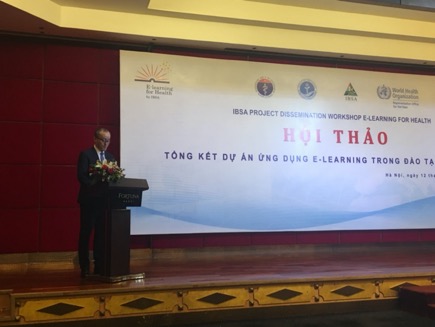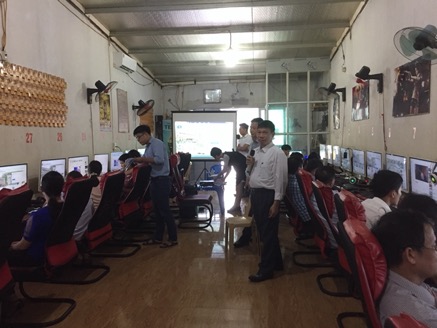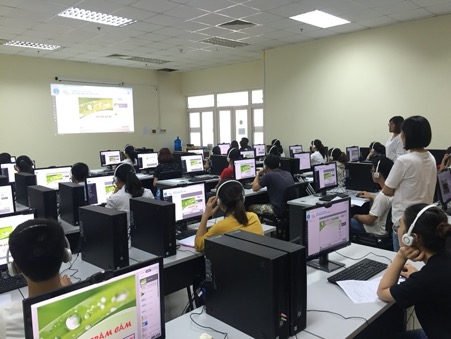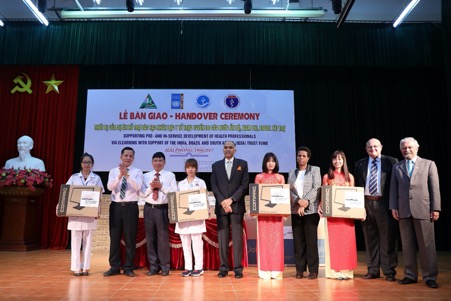An Innovative e-Learning Approach for Health: Pre- and in-service training for medical students and health workers for quality health service coverage
Improving coverage and quality of health services in disadvantaged areas of Viet Nam
Challenges
Viet Nam is undergoing a reform of its primary health care network, as part of its commitment to attain health-related Sustainable Development Goals (SDGs). These goals relate to the rising burden of non-communicable diseases (NCDs), the continuing threat of communicable diseases, and the need to move towards universal health coverage (UHC) and ensure equitable access to quality health services. A strong health workforce is critical to the achievement of these goals and is a high priority for the Ministry of Health. However, there are several constraining factors, such as the lack of resources to cover the training of all health workers nationwide, lack of government institutions that can provide the training, and limited access to up-to-date, evidence-based learning modules and training approaches. Traditional classroom style training also takes frontline health care workers away from the workplace, thus disrupting service delivery.
Towards a Solution
The objective of the project was to develop and implement an e-learning system that will cover both pre-service and in-service training of health workforce, with the adequate and appropriate technological infrastructure and teaching methodologies, which can optimize the sharing of knowledge by healthcare training institutions in Viet Nam. It aimed to improve coverage, equal access, and quality of healthcare services for the poorest and most vulnerable population groups in the northern coastal region of Viet Nam, with a special focus on the management of NCDs at the primary healthcare level. The project addressed Sustainable Development Goal (SDG) 3 (Good health and well-being) targets 3.4 (on premature mortality/NCDs), 3.8 (on universal health coverage) and 3.c (on health workforce) as well as 3.1 (on maternal mortality), 3.2 (on neonatal and child mortality) and 3.3 (on communicable diseases).
In the spirit of South-South cooperation, the innovative India, Brazil and South Africa Facility for Poverty and Hunger Alleviation (IBSA Fund) had channelled funds to the World Health Organization (WHO) office in Viet Nam, through the United Nations Office for South-South Cooperation (UNOSSC). Using this fund, WHO supported the procurement of hard- and software and helped build capacity of, and provided technical assistance to, Hai Phong University of Medicine and Pharmacy (HPMU) through WHO experts. HPMU is one of the key training institutions for the health workforce in Viet Nam, which covers the northern coastal region. In this project, HPMU played a key role in designing, developing, delivering and testing initial pilot e-learning modules. The Ministry of Health (MOH) of Viet Nam was one of the signatories from the inception of the project, and played a significant role in providing policy guidance and support for future national roll out of the model. The project has benefited from regular oversight and guidance by a Steering Committee, which included ambassadors from the three IBSA embassies, representatives of the MOH, HPMU and WHO Viet Nam.
The project started with the inception workshop followed by a needs assessment and the drafting of the blueprint of the e-learning IT platform. WHO provided training of HPMU lecturers and IT staff to develop and upload training material on NCDs, using innovative e-learning modules that can be accessed by medical students at the HPMU and frontline health workforce at four selected districts in the Northern Coastal Region. The project supported the development of additional e-learning content and delivery beyond the pilot module. The e-learning project trained 134 district-level and 160 commune-level staff in remote areas during the pilot, with an additional 600 students enrolled in the e-learning system.
The project has succeeded in establishing significant levels of skills and infrastructure within HPMU to develop and deliver effective e-learning as an approach to Continuing Medical Training (CME), and in overcoming barriers to training experienced by many remote-site medical settings. It demonstrated that the e-learning system enabled frontline health care workers to upgrade their knowledge and skills with minor disruption in service delivery as these courses can be accessed on their smartphones or computers at a time suitable to them.
The project is an innovative initiative because at the time the project was developed, no other medical university in Viet Nam used e-learning methodology to train students who live in remote areas. The project also established a new way of providing health professional training in the country by “bringing teaching to learners, and not bringing learners to teaching”, to overcome geographic, financial and other learning barriers for health workers working in remote communities. Preparations to scale up the model have already begun as part of the project. This includes: the creation of additional modules and online resources; the development of an e-library and a mobile app; the initiation of approval of the course contents to be certified by MOH as CME materials; and additional training of HPMU IT and library staff to develop a communication and engagement strategy to reach out to and disseminate the experiences of the project to other medical universities and involve more healthcare settings in the country.
HPMU has continued to utilize and expand the e-learning platform even after the completion of the project. In 2020, in light of the increasing demand to enhance the knowledge of health workforce to respond to the outbreak of COVID-19, WHO and HPMU jointly enhanced the e-learning platform by adding online training modules developed by WHO on COVID-19 in areas such as clinical care for severe acute respiratory infections, and other guidelines for treatment of COVID-19 at primary care settings. The special COVID-19 related courses were made accessible to all health workers and medical students free of charge.
Contact Information
Name: Dr Kidong Park Title: Representative Organization: World Health Organization (WHO) Country Office for Viet Nam
Countries involved
Brazil, India, South Africa, Viet Nam
Nominated By
World Health Organization (WHO) Viet Nam
Supported By
IBSA (India, Brazil and South Africa) Multi-trust fund and WHO Country Office for Viet Nam; Multi-trust fund managed by United Nations Office for South-South Cooperation
Implementing Entities
Hai Phong University of Medicine and Pharmacy through the Ministry of Health of Viet Nam
Project Status
Completed
Project Period
2015 - 2019
Sectors
Health
Primary SDG
03 - Good Health and Well-being
Secondary SDGs
03 - Good Health and Well-being
Similar Solutions











